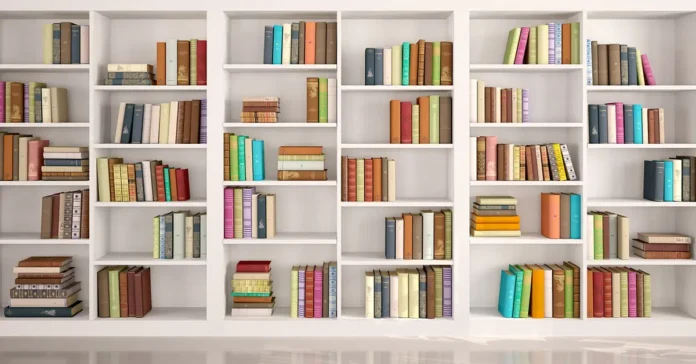Are you tired of a cluttered bookshelf that makes finding your favorite reads a challenge? Decluttering your bookshelf can transform it into an organized and visually pleasing space where every book has its place. To understand more on how to declutter a bookshelf go through the step-by-step. Imagine a bookshelf where each book is neatly arranged, making it easy to find what you’re looking for. With a few simple techniques and a bit of dedication, you can store them properly.
Decluttering doesn’t mean getting rid of all your books; it’s about making the right choices that make sense for you. Whether you’re a book lover looking to streamline your collection or someone who wants a more organized living space, this guide is for you. Get ready to say goodbye to clutter and hello to a bookshelf that’s both functional and beautiful.
How to Declutter a Bookshelf ?
Decluttering a bookshelf involves several key steps to organize and streamline your collection. Start by assessing your books, and deciding what to keep based on relevance and enjoyment. Then categorize them by genre, author, or theme to create a cohesive layout. Remove any unnecessary items and consider using storage solutions like baskets or bins for smaller items. Rearrange your books to maximize space and showcase your favorites prominently. Regularly review to maintain a clutter-free and visually appealing bookshelf that reflects your style and interests.
1. Start by Removing Things from Shelves
It is time to start organising the shelves because they are stacked with a collection of books you have never read. Start by removing everything from the shelves and putting them into stacks. The piles do not need to be organised just yet; simply remove the items and clean your shelves at this stage.
Go through each bookshelf in turn if you have more than one. Work your way through the oldest books first before moving on. After going through each shelf, remove everything from the room and discard everything you no longer need or want.
2. Discard What You Do Not Need
Consider getting rid of one copy of any books you have numerous copies of. Check if your friends and family are interested in picking up a copy from you.
It makes no sense to have several identical copies of the same book. If you do, it is likely because you have no memory of when you purchased it or awareness of its presence on your busy bookshelf!
While duplicates are the easiest to put away, look for other books also that can be discarded. Ask yourself these three questions to identify whether a book needs to be in your study or not:
- Have I read this book before?
The publishing world is evolving quickly. Though it looks straightforward, this question turns out to be quite challenging to respond to. Even while you might believe you have every book in your home under control, there is a high possibility you have lost track of a few through the years. So how can you determine if you have read a particular book before? Keep a journal or spreadsheet, or design a colour code to highlight read books.
- Do I Want to Read This Anymore?
This is the second important question to ask while discarding your books. Even for book lovers, some books are received as gifts and are simply not to our taste. If you have not read them over a period of time, chances are low that you will in the future. Take the courage to give it to someone who will actually read it.
- Can I easily find it in the library?
Finally, ask yourself if you want to hold on to a copy of an oft-read book if you can find it in the library or as a digital version. Many book lovers are buying fewer paperbacks and opting for e-books. Can you be one of them?
3. Group Books More Thoughtfully
Experts advise that beginning with your preferred genres and expanding from there is the best way to organise a book collection. Start with mysteries, if you prefer. Afterward, venture into science fiction, fantasy, romance, etc. You will discover that some topics are related to one another; for example, you might adore reading historical fiction as well as science fiction.
By organising books by theme, you may find what you are looking for more quickly and find books that you might like to read later. How books are grouped together on each shelf will help you quickly decide where to look next. Additionally, grouping books by theme can help connect them and make it easier for you to find the one you have been looking forward to reading.
Remember these three rules when grouping your books for a library:
- Group like-items together
- Create categories based on genres or purpose
- Use dividers to separate different sections, especially with large collections
4. Make Room for New Books
You are now prepared to add new books to your library after it has been arranged. Where do you store them, though? According to rd.com, it is ideal to organize 60 percent of books vertically and 40 percent in horizontal stacks to create both balance and spontaneity.
Instead of stacking books on top of each other, place them side by side – vertically. This allows you to see every single book while saving floor space. Organize your books by size. Smaller books tend to take up less room, so they make sense to store near larger volumes.
5. Add Large Baskets to the Two Bottom Shelves
Placing items where you use them most frequently is the greatest method to arrange items on shelves. However, sometimes it is difficult to notice what is hidden beneath the clutter on the floor. Additionally, everything is thrown into one large pile because there are no bins underneath those shelves. Finding anything becomes incredibly difficult as a result. Therefore, we advise putting big baskets on the two bottom shelves. They will make it simpler to locate items like hats, scarves, socks, and shoes. They are also useful for keeping tiny goods like toys, books, games, and other things organised.
Also use shelving units, which are perfect for displaying smaller items such as picture frames, vases, figurines, knickknacks, etc.
6. Staying organised
On an ongoing basis, as you buy new books, it is a good idea to have some handy boxes labeled – Keep, Sell/ Trade, Donate, or Recycle. This saves you from having to search through mountains of books each time you want to find something.
Before marking the box, keep it tidy and well-organized. Choose a category for the box, such as “Keep,” “Sell/Trade,” or something similar. Put the date when the box was first used inside after that. Finally, jot down any reminders you will need for the next time you utilize the box. You might also think about giving books to libraries or schools. Also frequently accepting book contributions are libraries. They may offer them for free, sell them online, or host gatherings where readers could gather and debate the books.
Final Words on How to Declutter a Bookshelf
Decluttering your bookshelf is not just about tidying up; it’s about creating a space that reflects your interests. You can transform your bookshelf into a functional and visually appealing one in your home. Make sure to regularly review your collection, and leave the books that no longer you want. Embrace the opportunity to curate a collection that brings you joy and inspires you to read more. Utilize storage solutions wisely to keep your bookshelf organized and clutter-free.
Ultimately, a well-organized bookshelf not only makes finding and enjoying your books easier but also adds personality and charm to your living space. So, roll up your sleeves, dive into decluttering, and create a bookshelf that reflects your unique style and love for reading!
FAQs on How to Declutter a Bookshelf
A1. Start decluttering by taking all the books off the shelf and sorting them into categories like keep, donate, or discard.
A2. You can donate those books to libraries, schools, or charity organizations, or sell them online.
A3. You can keep books that you like, will read again, or have sentimental value. Consider them if you have space to keep them safe.
A4. You can create a separate shelf or pile for unread books and set a goal to read them within a specific timeframe.
A5. Organize them by genre, author, color, or size, depending on your preference and ease of access.
A6. Only keep textbooks or reference books that you frequently use or have sentimental value. Consider donating outdated ones.
A7. You can maximize space by using bookends, stacking books horizontally, or investing in adjustable shelves.
A8. Aim to declutter at least once a year to keep your collection manageable and organized.
A9. Regularly review your collection, avoid impulse book buying, and keep the shelf tidy by dusting and arranging books as needed.
A10. Decluttering reduces visual clutter, makes it easier to find and enjoy your favorite books, and creates a more organized living space.







